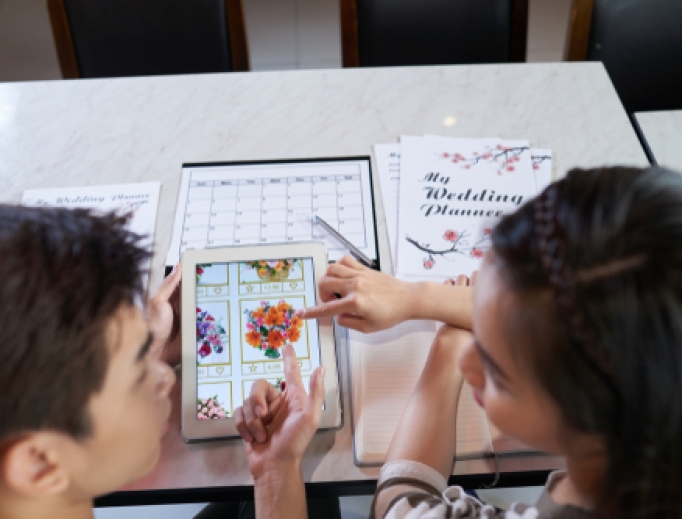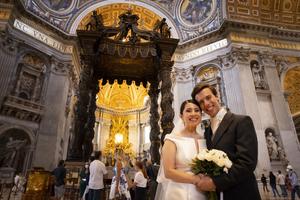Coronavirus Lockdowns Force Catholic Engagement Prep Online — for Good?
The sudden shutdown of in-person pre-Cana sessions is spurring Catholic dioceses and parishes to get creative, and the changes may outlast the coronavirus pandemic itself.

DENVER — Engaged for more than a year, Ashley Black had the perfect wedding planned out. She and her fiancé have a June 19 date, the feast of the Sacred Heart of Jesus and her grandparents’ wedding anniversary, with 220 guests.
But now due to the coronavirus pandemic and the lockdown in Colorado where she lives, everything is up in the air. She cannot get the marriage license. The government buildings are closed. The jewelry shop where she ordered the wedding rings: also closed. The perfect wedding dress is locked down at the tailor’s. She has catering and venue contracts that are on hold pending the state-wide shutdown is ends and business get back up-and-running by the wedding.
One part of the wedding planning checklist that Black and her fiancé do not have to worry about is engagement preparation. They did their marriage formation online through the Catholic marriage ministry that Black works for.
But for thousands of Catholic couples across the U.S. facing the stress of preparing for marriage and planning a wedding amid the uncertainty of the coronavirus pandemic, going through marriage formation online is the new normal. And in this regard, the pandemic may permanently alter how the Church does marriage formation as almost overnight, marriage ministry moves from in-person gatherings to online or virtual-interactive models of marriage formation.
Dioceses and parishes have scrambled to get Catholic couples formed online for marriage through a variety of options rather than attempt to wait out the coronavirus shutdowns for in-person meetings.
Christian Meert, founder of Agape Catholic Ministries (for which Black works) and director of the Diocese of Colorado Springs marriage and family life office, told the Register that ACM’s online marriage formation program, Catholicmarriageprep.com, has seen triple the typical volume of requests for marriage formation as dioceses transfer their couples to the program.
“They’re pushing couples to classes online right now as much as they can,” he said, “because they are afraid that when this crisis ends a lot of couples will come all at once to the in-person classes, and it will be too much.”
Right now, there is no definite end to various state lockdowns, and even if they are lifted, Catholic churches may still have to operate under social distancing requirements that are lifted by degrees. And there is no guarantee lockdowns will not occur again, such as if Covid-19 surges in the Fall similar to the flu, until a safe and successful vaccine is widely implemented.
For years, Meert has made the case that marriage formation for the sacrament of matrimony needs to help a couple dive deep into the heart of the Catholic faith and be interactive with the couple, so that formation can address each couple’s unique needs and backgrounds.
Meert’s ministry has an instructor couple work one-on-one with each couple. He said the online-interactive approach removes the peer pressure in a group setting for a couple to pretend they are on the same page as everyone else. And they have less distractions to really work through and discuss each topic. The instructors work one-on-one with them, sharing insights from their own marriage and the teaching of the Church.
The normal time to complete the program is 90 days, but given the crisis, the time for completing the program is now extended to 120 days. Meert said queries from couples getting married in May or June are on the priority list for his team.
Meert said dioceses are now going to be able to evaluate the difference in marriage formation between the in-person class model and the online-interactive model.
“They will see the results,” he said.
Relationship-Based Approaches
At a parish level, inter-personal marriage formation programs like Witness to Love, that take a catechumenal approach to marriage formation with mentor couples for the engaged, are seeing the strengths of their program translate well from the living room setting to the video chat setting.
"It's an approach that connects people, not just resources," explained Daniela Mazzone, a parish coordinator for the Witness to Love marriage catechumenal program. She meets with couples and mentors via Zoom or Video chat to give them some tips on how to make it work with social distancing.
“The good thing with this program is that it doesn’t depend on being in the physical building of the church or a conference to attend,” she said.
And Witness to Love is well-prepared to work in the pandemic because it is relationship-based: the main difference now is that rather than meetings taking place in a person’s home, they take place over video chat.
“The essence of the program is that every marriage has something to give, something to offer, and something to share with other couples,” she said. “And so you can still do that: you can still share your witness and share the story of your own marriage, even if you're not doing it in person.”
The centerpiece of the Witness to Love approach is that couples grow in marriage, and the engaged couples have a relationship with the mentor couple they picked that lasts beyond the wedding date, and will provide them an ongoing source of wisdom to talk to.
“These times make that necessity all the more clear, because we're seeing just what isolation causes,” she said, “and even though we have all these ways to connect on social media and whatnot, it's important to have like true authentic relationships of trust and true community.”
Mary-Rose Verret, co-founder of Witness to Love, told the Register that the isolation that couples are experiencing right now underscores the need for marriage formation to be interpersonal with a mentor couple who can integrate them into the larger community of the Church before and after the wedding.
“These couples more than any time in history need accompaniment and community,” she said.
Different Diocesan Approaches
Dioceses are also retooling their pre-Cana gatherings to go online and be interactive with couples. Matt Selby, director of marriage and family life at the Archdiocese of Dubuque ,said that his office had to cancel the Engaged Encounter weekend, but rather than cancel the pre-Cana sessions, he embarked on providing them in a virtual format for the couples that had signed up.
The all-day pre-Cana session was reduced to a four-hour Saturday morning session over Zoom. Each speaker provided the content, with an opportunity to discuss the material. They used the chat feature on Zoom to provide people an opportunity to ask questions.
“We’ve done that twice now,” he said, adding that both sessions went smoothly and they have had a lot of positive feedback, especially on the interactive part. Couples liked the opportunity to talk through it and work out some of those questions. The second time around they decided to try to incorporate more breaks to help people get through four hours of sitting in the Zoom session.
“We’re trying to be more intentional about making it more interactive,” he said. “That’s the main thing we’re working on.”
Having marriage formation continue in an online-interactive format helps provide couples a good sense of being grounded, even if the wedding is postponed. And Selby explained that while his preference would be for in-person pre-Cana sessions, they are learning a lot about how to make them more interactive and how pre-Cana via Zoom might be a good option for couples whose schedules or distance makes attending an in-person session very difficult.
The Archdiocese of Portland takes a decentralized approach to marriage ministry, and provides support to parishes providing marriage formation to the engaged.
“The conversations are on ongoing with parishes,” Jason Kidd, the archdiocese’s marriage and family life director, told the Register. He said parishes have taken a variety of approaches to people connected, discovering new capabilities via FaceTime, Google Hangouts, or Zoom, to be present despite the physical separation. Key to marriage formation, he said, is keeping the relationship up front and center.
“So the script is not entirely going out of the window, but it is changing,” he said. Kidd stressed the interactive, interpersonal communication in marriage formation was vital, especially given the upheaval couples are facing with weddings postponed or vastly reduced in size, and canceled honeymoons.
“They’re not sure what to do and things are in flux,” he said. “And that’s a great opportunity for the mentor couple to listen and just encourage them.”
Kidd added the Church has to be sensitive to where engaged couples are in their lives as they engage them with the Church’s vision for marriage and teaching. Some are already living together, but in these abnormal times, some couples are taking in economically-distressed friends and family into their homes.
“We’ve got to worry about stopping the bleeding,” he said.
Staying Grounded
At the same time, Kidd said, the kind of vulnerability these couples and everyone in the Church is experiencing “creates an openness” to really being open and sharing what is most important in their lives.
“There's a huge opportunity for the Church to not just check the box but process these deeper questions of life,” he said.
Ashley Black said she and her fiancé have been using the skills learned in engagement preparation, and while nothing really prepares a person for living in a pandemic, those skills have helped them communicate better and stay strong through the crisis. And they have placed their marriage and wedding date in God’s hands by deepening their dependence on prayer, especially the Rosary.
“Whatever happens, it is in God's hands,” she said. “We just have to trust that as a couple.”
Peter Jesserer Smith is a Register staff writer.

















